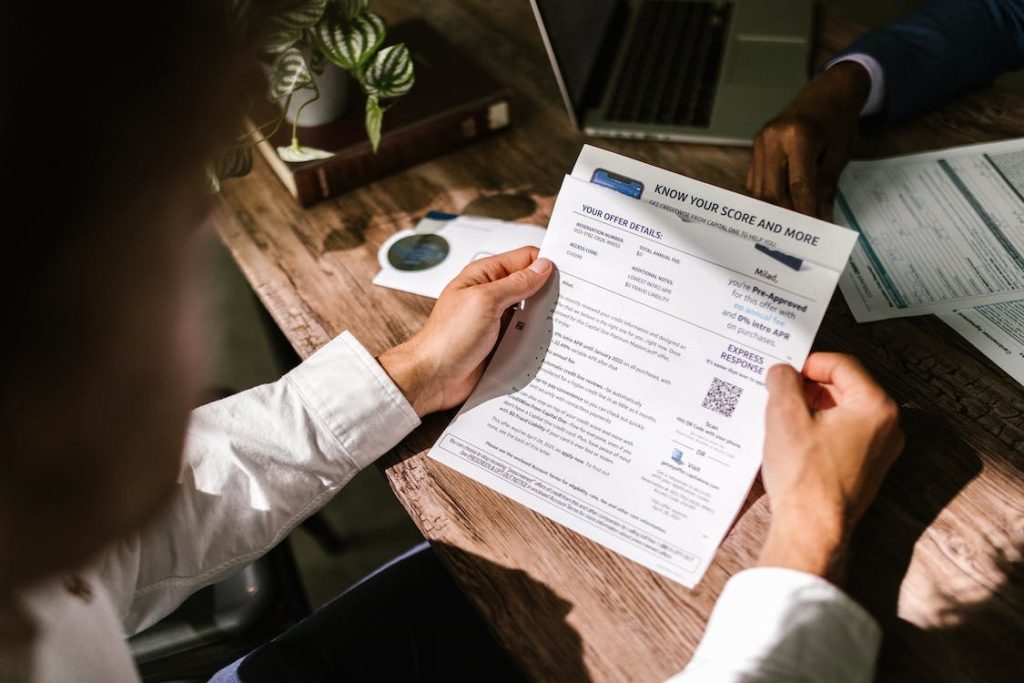A bank statement is a document that provides the account holder with a detailed record of all transactions that have occurred in the bank account over a specific period of time.
It is usually issued monthly or quarterly and can be accessed online or received in paper form. The statement includes information about the account holder such as deposits, withdrawals and any fees or charges that have been incurred.
Understanding the Components of a Bank Statement
A bank statement usually contains the following information related to your checking account.
- Account Summary: This statement displays your name and address, account number and balance at the top.
- Transaction History: A detailed list of all transactions made during the statement period, including deposits, withdrawals, transfers, and more. However, your bank statement may not include pending transactions.
- Fees incurred: A list of fees, including ATM fees and monthly maintenance fees.
- Accrued Interest: In the case of an interest-bearing account, the interest earned on the account during the statement period.
- Statement Period: Specify the beginning and ending dates of the statement period.

The Importance of Bank Statements to the Budget
Bank statements are a valuable tool when creating and maintaining a budget. By examining your transaction history, you can gain insight into your spending habits and identify areas where you can cut or adjust spending.
When using your bank statement for budgeting, consider the following.
- Categorize your spending: Break down your transactions into categories such as groceries, utilities, dining out, and entertainment. This will help you visualize where your money is going and make it easier to analyze your spending habits.
- Identify trends: Look for patterns in your spending, such as recurring expenses, seasonal changes, or impulse spending. This can help you make more informed decisions about your financial habits and set realistic budget goals.
- Set spending limits: Based on your analysis of your spending habits, set limits for each category in your budget. Check your bank statements regularly to make sure you’re staying within those limits and make adjustments as necessary.
- Track your progress: Use your bank statements to monitor your progress toward financial goals, such as saving for a vacation or paying off debt. This will help you stay motivated and accountable.
How can I use a bank statement?
Bank statements provide a comprehensive overview of your financial activities and are a great tool for managing your finances. By scrutinizing the details on your statement, you can ensure that all of your checking and debit card transactions are recorded accurately and legally. This helps protect you from potential fraud or unauthorized charges.
In addition, regularly reviewing your bank statements will help you identify any unnecessary or excessive charges. This can help you make informed decisions, optimize your spending, and ultimately improve your financial situation.
How to Review Your Bank Statement
To effectively review your bank statement, consider the following expert advice:
- Check with records: Before delving into your statement, gather all relevant records, such as checkbook entries or online transaction records. Cross-reference these with the transactions listed on the statement for accuracy.
- Investigate unusual transactions: You should investigate transactions that you do not recognize. Contact your bank immediately to report any suspicious activity and protect your account.
- Verify Fees and Charges: Make sure all fees and charges on your statement are accurate and not duplicated. Report any discrepancies to your bank for resolution.
- Match Balances: Ensure that account balances on statements match your records. Investigate any discrepancies.
- Check for Missing Transactions: Make sure all transactions you remember are listed on your statement. Check with your bank for any missing transactions.
- Review the date range: Make sure the statement covers the correct time period and that all transactions are included.
- Watch for small transactions: Scammers often use small transactions to test whether a credit card is valid, so be careful with these.
How to Get a Bank Statement
Here are some ways to get bank statements from your financial institution:
- Online banking: Ditch the paper and go digital. Most banks offer electronic statements that can be viewed and downloaded through your online banking account. Simply log in and go to the “Statements” or “Account History” section to access your bank statement online.
- Mobile App: The convenience of mobile banking extends to accessing your bank statements. Log in to your mobile app, find the “Statements” or “Account History” section, and download.
- In person: If you prefer paper bank statements, visit your bank branch and ask a customer service representative for a statement. You may need to provide identification, and there may be a fee for this service.
- By mail: Some banks offer to mail statements on a regular basis. Contact your bank to enroll and make sure your mailing address is up to date.
- Telephone banking: Request a statement through your bank’s customer service line. Follow the instructions to mail or e-mail them.
- Email Requests: Some banks accept statement requests via email. Simply send the request to the customer service department.

How often should you check your bank statement?
We recommend that you check your bank account statements at least once a month. This habit ensures the accuracy of transactions and helps to quickly detect any potential fraud. Regularly monitoring your bank statements is essential to ensuring and maintaining your financial health.
Keeping track of your expenses and finances is made easier with a monthly review of your bills. Before making a major financial move, such as taking out a loan or making a major purchase, it’s smart to double-check your statements for sufficient funds and any errors.
Don’t forget to report any unauthorized transactions to your bank in a timely manner. Regular monitoring of your bank statements is essential to ensure and maintain your financial health.
How long does the bank keep my bank statement?
Under the Bank Security Act, banks are required to keep records of bank statements for up to five years. Even if you close your account, the bank will keep your records. Statements may be needed for tax audits, loans, legal proceedings, or other purposes.
You can usually access your most recent bank statement online for free. However, banks may charge for old statements. Keep your account information safe by shredding any bank statements you no longer need.
Organize and store your bank statements
To keep track of your financial records and maintain an organized system, consider the following tips for storing your bank statements:
- Digital Storage: Keep an electronic copy of your bank statements in a designated folder on your computer or in a secure cloud storage service. Back up your digital files regularly to prevent loss of information.
- Physical storage: If you prefer paper statements, keep them in a filing cabinet or dedicated binder, categorized by date or account type. Store them in a secure place, such as a locked cabinet or safe.
- Shred old statements: As mentioned earlier, shred any old bank statements that you no longer need. This helps protect your personal information from identity theft or fraud.
Using Bank Statements for Financial Planning
Bank statements are a valuable resource for long-term financial planning. By reviewing your statements on a regular basis, you can gain a better understanding of your income, expenses, and financial trends. This information can help you develop financial goals and strategies.
Here are some ways to use your bank statements for financial planning:
- Build an emergency fund: Analyze your monthly expenses to determine how much you need to set aside in an emergency fund. The goal is to save enough for at least three to six months of living expenses.
- Retirement Planning: Review your bank statements to assess your current savings rate and find ways to add to your retirement accounts, such as a 401(k) or Individual Retirement Account (ira).
- Reduce Debt: Use your bank statements to assess your current debt level and create a plan to pay off high-interest debt first. This can save you money on interest payments and improve your overall financial situation.
- Save for big-ticket items: Analyze your bills to determine how much you can realistically save each month for big-ticket items, such as a new car or a down payment on a house. Set a savings goal and track your progress over time.
- Investing: Use your bank statements to evaluate your finances and determine how much you can invest in stocks, bonds, or other assets. This can help you build wealth and achieve your long-term financial goals.

Benefits of checking your bank statement regularly
There are many benefits to regularly reviewing your bank statements, including:
- Improved financial awareness: Regularly checking your bank statements can help you understand your financial situation, making it easier to identify and address any issues that may arise.
- Better budget management: By analyzing your expenses, you can create a more accurate budget and make adjustments as needed to stay on track with your financial goals.
- Fraud Detection: Regularly reviewing your statements allows you to quickly identify unauthorized transactions and report them to your bank. This minimizes the financial impact of fraud and helps protect your accounts.
- Expense management: Keeping a close eye on your bank statements can help you identify any excess or unnecessary charges, which can save you money in the long run.
- Credit Score Improvement: Regularly reviewing your bank statements can help you identify and address any issues that could negatively impact your credit score, such as late payments or high credit utilization.
Conclusion
A bank statement is an important document that provides a comprehensive overview of all the transactions in your bank account. Checking it regularly can help you spot any discrepancies, accounting errors, or fraudulent activity.
Additionally, it allows you to track your spending habits, fees and charges and make adjustments to better manage your finances. By staying organized, staying vigilant, and checking your bills regularly, you can maintain a strong financial foundation.




